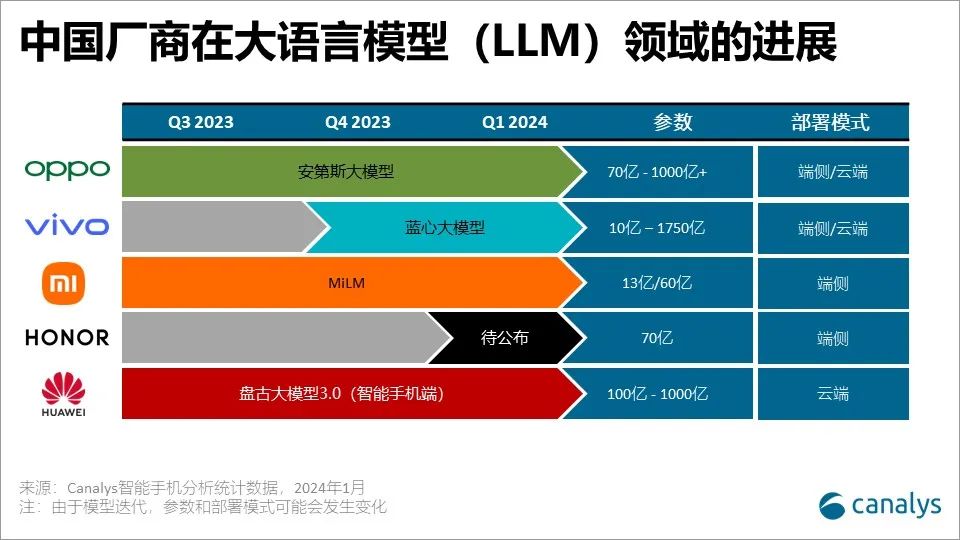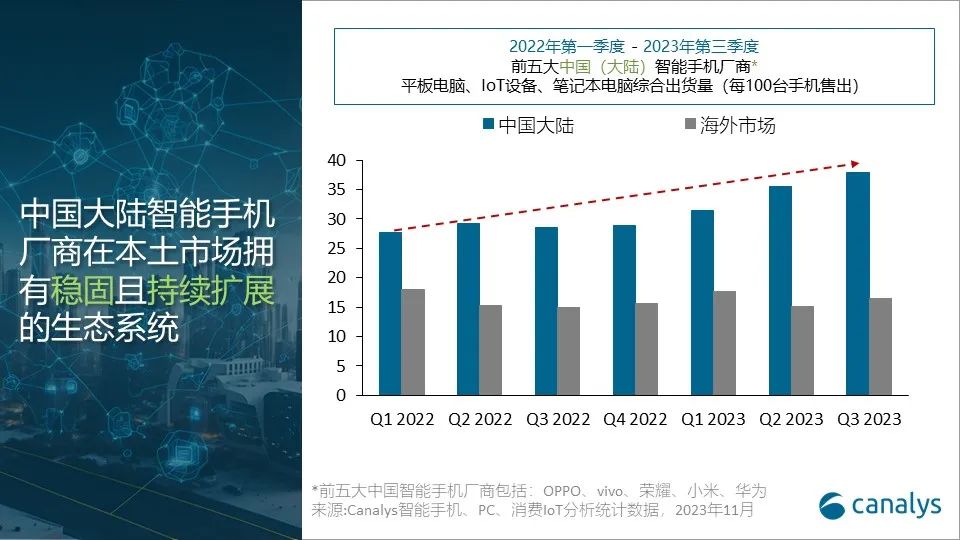 Hardware Tutorial
Hardware Tutorial
 Hardware News
Hardware News
 AI development momentum and potential of the five major Chinese mobile phone manufacturers: Canalys report
AI development momentum and potential of the five major Chinese mobile phone manufacturers: Canalys report
AI development momentum and potential of the five major Chinese mobile phone manufacturers: Canalys report
According to a recent report released by Canalys, a well-known technology market analysis organization, under the current market structure, AI is becoming a strategic priority for manufacturers.
In order to stand out in the fierce market competition, Chinese smartphone manufacturers are treating AI as an important strategy. With Huawei's re-emergence in the market, defending market share and investing in the development of new and eye-catching features have gradually become the focus of other manufacturers, and AI is expected to become a key factor in this strategic change.
Some local manufacturers with strong horizontal integration capabilities are strategically applying AI to a wider range of hardware categories. This enables the deployment of AI not only to be limited to a single category of mobile phones, but also to a wider range of hardware such as PCs, wearables, TVs, and even cars.
In this way, manufacturers can build a more complete and interconnected ecosystem, and AI can play a key role in it, enhancing the functional experience of a single device and the connectivity between multiple devices.
In addition, as Chinese manufacturers transition to high-end strategies, the market still needs new driving forces in addition to technologies such as foldable screens and 5G. AI, especially the ability to run through generative large models on the hardware side, will boost the growth of the high-end market.
Canalys predicts that the demand for end-side AI capabilities is expected to stimulate a new round of replacements and help increase the average selling price (ASP) of equipment. Manufacturers' strategic focus on AI deployment is also closely linked to the path to high-end, and AI capabilities will also become an effective starting point for manufacturers to promote high-end.
Recently, China’s local smartphone manufacturers have been actively investing in self-developed large language models (LLM). The following are several LLMs recently launched by Chinese manufacturers that will be installed on smartphones.

With the iteration of SoC and the recent rapid upgrade of storage configurations (especially DRAM) on the market, although most Chinese manufacturers still adopt a device-cloud hybrid AI deployment model, But it has also begun to focus more on the capabilities of end-side AI.
The ecological advantages of local manufacturers in the local market enable AI to play a greater role
Compared with its overseas markets, Chinese local manufacturers often have higher add-on rates in the local market and provide It provides a more comprehensive hardware product coverage, and these factors can make AI benefit a wider range of users and application scenarios. For example, Xiaomi's Mijia ecosystem and Huawei's Hongmeng Smart Connect have established a considerable user base in the country.

In addition to providing wearable devices and tablets locally that are also sold overseas, these manufacturers also actively cooperate with local ecological partners to provide products such as home appliances and even More extensive ecological hardware such as cars. With the wide coverage of hardware categories and a more solid user base, AI is expected to play a greater role, leading to more diverse usage scenarios and a more seamless multi-device experience.
High-performance equipment with affordable prices promotes the development of end-side AI
Canalys predicts that Chinese manufacturers will take the lead in bringing AI-capable smartphones into lower price ranges, thus accelerating AI Cell phone penetration. Taking into account the fierce market competition, supply chain cost advantages and local consumers' recognition of cost-effective equipment, local manufacturers have begun to provide flagship-level performance products at extremely competitive prices.
These devices with end-side generative AI running performance and equipped with generative AI features will provide a relatively differentiated use experience. Local manufacturers are expected to have a greater advantage in the mid-range market. Since overseas manufacturers will be difficult to provide equipment with the same hardware performance in the corresponding price range, their end-side AI experience in the mid-range market will be far behind that of local manufacturers.
Local manufacturers (such as Huawei) with strong brand appeal can gain a competitive advantage by establishing close cooperative relationships with local developers. Recently, Chinese software giants (such as Meituan, Alibaba, etc.) have begun to actively cooperate with Huawei to develop native applications for Huawei's HarmonyOS NEXT operating system that are independent of the Android application ecosystem.
Localized operations are the key to spawning an AI application ecosystem
By analogy, when third-party developers need to integrate large AI models in their applications, the same cooperation model may also occur. This cooperation model can provide exclusive, high-quality and differentiated experiences in the future wave of AI application development, thereby creating competitive advantages for manufacturers.
The above is the detailed content of AI development momentum and potential of the five major Chinese mobile phone manufacturers: Canalys report. For more information, please follow other related articles on the PHP Chinese website!

Hot AI Tools

Undresser.AI Undress
AI-powered app for creating realistic nude photos

AI Clothes Remover
Online AI tool for removing clothes from photos.

Undress AI Tool
Undress images for free

Clothoff.io
AI clothes remover

Video Face Swap
Swap faces in any video effortlessly with our completely free AI face swap tool!

Hot Article

Hot Tools

Notepad++7.3.1
Easy-to-use and free code editor

SublimeText3 Chinese version
Chinese version, very easy to use

Zend Studio 13.0.1
Powerful PHP integrated development environment

Dreamweaver CS6
Visual web development tools

SublimeText3 Mac version
God-level code editing software (SublimeText3)

Hot Topics
 1386
1386
 52
52
 How to solve the complexity of WordPress installation and update using Composer
Apr 17, 2025 pm 10:54 PM
How to solve the complexity of WordPress installation and update using Composer
Apr 17, 2025 pm 10:54 PM
When managing WordPress websites, you often encounter complex operations such as installation, update, and multi-site conversion. These operations are not only time-consuming, but also prone to errors, causing the website to be paralyzed. Combining the WP-CLI core command with Composer can greatly simplify these tasks, improve efficiency and reliability. This article will introduce how to use Composer to solve these problems and improve the convenience of WordPress management.
 How to solve SQL parsing problem? Use greenlion/php-sql-parser!
Apr 17, 2025 pm 09:15 PM
How to solve SQL parsing problem? Use greenlion/php-sql-parser!
Apr 17, 2025 pm 09:15 PM
When developing a project that requires parsing SQL statements, I encountered a tricky problem: how to efficiently parse MySQL's SQL statements and extract the key information. After trying many methods, I found that the greenlion/php-sql-parser library can perfectly solve my needs.
 How to solve complex BelongsToThrough relationship problem in Laravel? Use Composer!
Apr 17, 2025 pm 09:54 PM
How to solve complex BelongsToThrough relationship problem in Laravel? Use Composer!
Apr 17, 2025 pm 09:54 PM
In Laravel development, dealing with complex model relationships has always been a challenge, especially when it comes to multi-level BelongsToThrough relationships. Recently, I encountered this problem in a project dealing with a multi-level model relationship, where traditional HasManyThrough relationships fail to meet the needs, resulting in data queries becoming complex and inefficient. After some exploration, I found the library staudenmeir/belongs-to-through, which easily installed and solved my troubles through Composer.
 How to solve the problem of PHP project code coverage reporting? Using php-coveralls is OK!
Apr 17, 2025 pm 08:03 PM
How to solve the problem of PHP project code coverage reporting? Using php-coveralls is OK!
Apr 17, 2025 pm 08:03 PM
When developing PHP projects, ensuring code coverage is an important part of ensuring code quality. However, when I was using TravisCI for continuous integration, I encountered a problem: the test coverage report was not uploaded to the Coveralls platform, resulting in the inability to monitor and improve code coverage. After some exploration, I found the tool php-coveralls, which not only solved my problem, but also greatly simplified the configuration process.
 How to solve the complex problem of PHP geodata processing? Use Composer and GeoPHP!
Apr 17, 2025 pm 08:30 PM
How to solve the complex problem of PHP geodata processing? Use Composer and GeoPHP!
Apr 17, 2025 pm 08:30 PM
When developing a Geographic Information System (GIS), I encountered a difficult problem: how to efficiently handle various geographic data formats such as WKT, WKB, GeoJSON, etc. in PHP. I've tried multiple methods, but none of them can effectively solve the conversion and operational issues between these formats. Finally, I found the GeoPHP library, which easily integrates through Composer, and it completely solved my troubles.
 How to solve the problem of virtual columns in Laravel model? Use stancl/virtualcolumn!
Apr 17, 2025 pm 09:48 PM
How to solve the problem of virtual columns in Laravel model? Use stancl/virtualcolumn!
Apr 17, 2025 pm 09:48 PM
During Laravel development, it is often necessary to add virtual columns to the model to handle complex data logic. However, adding virtual columns directly into the model can lead to complexity of database migration and maintenance. After I encountered this problem in my project, I successfully solved this problem by using the stancl/virtualcolumn library. This library not only simplifies the management of virtual columns, but also improves the maintainability and efficiency of the code.
 Solve CSS prefix problem using Composer: Practice of padaliyajay/php-autoprefixer library
Apr 17, 2025 pm 11:27 PM
Solve CSS prefix problem using Composer: Practice of padaliyajay/php-autoprefixer library
Apr 17, 2025 pm 11:27 PM
I'm having a tricky problem when developing a front-end project: I need to manually add a browser prefix to the CSS properties to ensure compatibility. This is not only time consuming, but also error-prone. After some exploration, I discovered the padaliyajay/php-autoprefixer library, which easily solved my troubles with Composer.
 git software installation tutorial
Apr 17, 2025 pm 12:06 PM
git software installation tutorial
Apr 17, 2025 pm 12:06 PM
Git Software Installation Guide: Visit the official Git website to download the installer for Windows, MacOS, or Linux. Run the installer and follow the prompts. Configure Git: Set username, email, and select a text editor. For Windows users, configure the Git Bash environment.



